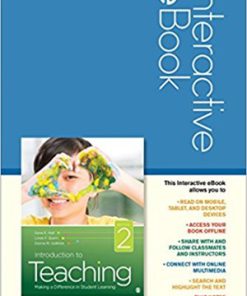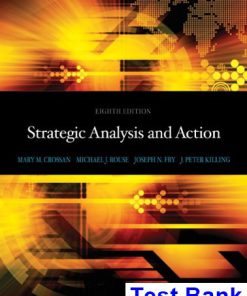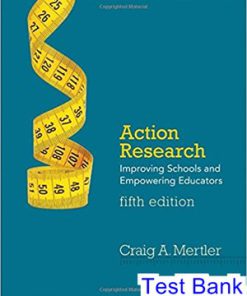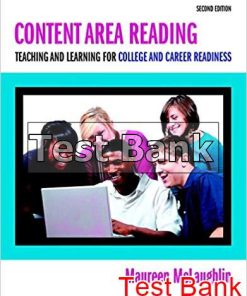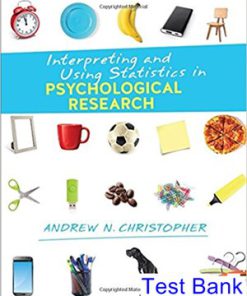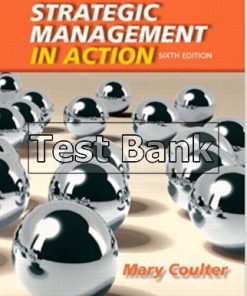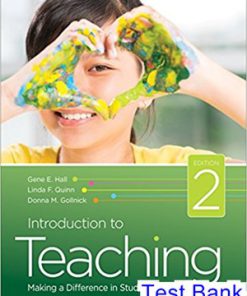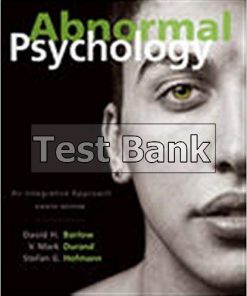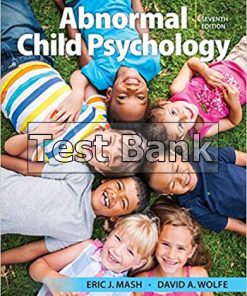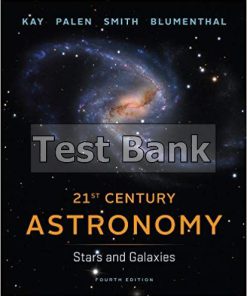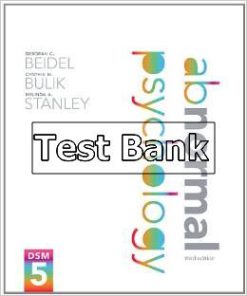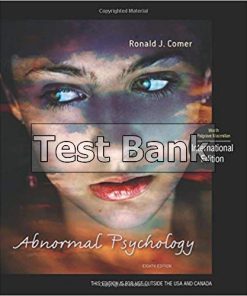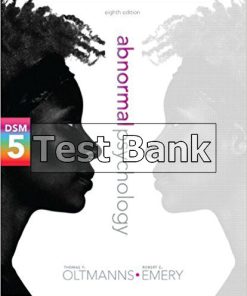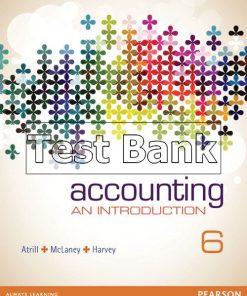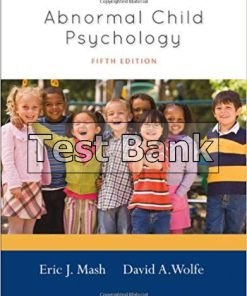Action Research Using Strategic Inquiry to Improve Teaching and Learning 1st Edition Rock Test Bank
$50.00 Original price was: $50.00.$26.50Current price is: $26.50.
Action Research Using Strategic Inquiry to Improve Teaching and Learning 1st Edition Rock Test Bank.
This is completed downloadable of Action Research Using Strategic Inquiry to Improve Teaching and Learning 1st Edition Rock Test Bank
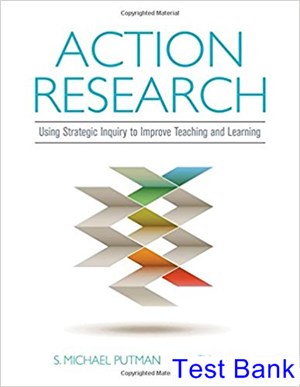
Product Details:
- ISBN-10 : 9781506307985
- ISBN-13 : 978-1506307985
- Author: S. Michael Putman (Author), Tracy C. Rock (Author)
Action Research: Using Strategic Inquiry to Improve Teaching and Learning is a core text for the Action Research course in Education. The proposed text seeks to address the needs of practitioners as it will be primarily written for use within a graduate level action research class. It will be oriented towards proactive planning as part of an organized, efficient process for developing and conducting an action research study. The book will be organized around implementation of the action research process using self-regulatory principles, which is characterized by four phases: task definition, goal setting and planning, enacting, and adapting. These four phases will be addressed as the learner considers what action research encompasses and a topic to be studied, then proceeds to establish a plan and enact it. This overall process is organized as can be seen in the Table of Contents. Michael Putnam and Tracy Rock will highlight methods and processes that incorporate formative data that is readily available to teachers, facilitating associations between classroom instruction and the action research process. The text will also reinforce how action research can improve the teaching and learning process by reinforcing or changing perceptions about the use of informal data, including anecdotal notes or observations, in the research process.
Table of Content:
- CHAPTER 1: WHAT IS ACTION RESEARCH?
- Guiding Questions
- Chapter Aims and Goals
- Setting the Context: Research in the Age of Accountability
- Why Conduct Research?
- What Is Action Research?
- Planning
- Acting
- Observing
- Reflecting
- Common Approaches to Research
- Action Research and Teaching
- Contexts for Teacher Action Research
- Taking Action: Using the CAPES Framework
- Summary
- Key Terms
- Case in Point: Introducing the Research Log
- One Elementary Teacher’s Journey: Preliminary Research Log Entry
- One Secondary Teacher’s Journey: Preliminary Research Log Entry
- Activities and Additional Resources
- PHASE II —GOAL SETTING AND PLANNING
- CHAPTER 2: IDENTIFYING A RESEARCH TOPIC
- Guiding Questions
- Chapter Aims and Goals
- Setting the Context: Choosing a Research Topic
- Formulate a Personal Educational Philosophy
- Narrow the Focus: Your Classroom, Your Experiences
- Taking Action: Developing the Research Topic
- Reflect Further on the Topic
- Write the Problem Statement
- Generate Solutions to the Problem
- Develop the Research Question
- Developing a Plan or a Product: Completing a Topic Proposal Form
- Evaluating Against the Standards: Are You Ready to Move On?
- Checklist: Developing the Topic for Action Research
- Checklist: Developing a Research Question
- Summary
- Key Terms
- Case in Point: Developing a Topic
- One Elementary Teacher’s Journey: Research Log Entry
- One Secondary Teacher’s Journey: Research Log Entry
- Activities and Additional Resources
- CHAPTER 3: CREATING A REVIEW OF LITERATURE
- Guiding Questions
- Chapter Aims and Goals
- Setting the Context: Sources of Information
- Types of Resources
- Peer-reviewed resources
- Primary or secondary sources
- Taking Action: Locating and Synthesizing Information
- Online Inquiries
- Google Scholar
- University Libraries
- Education Resources Information Center
- Other Sources of Information
- Selection of Relevant Literature
- Organize and Summarize Your Information
- Write the Synthesis of Literature
- Developing a Plan or a Product: Writing the Synthesis of Literature
- Evaluating Against the Standards: Are You Ready to Move On?
- Checklist: Synthesis of Literature
- Summary
- Key Terms
- Case in Point: Annotated Bibliography Entries
- One Elementary Teacher’s Journey: Annotated Bibliography Entries
- One Secondary Teacher’s Journey: Annotated Bibliography Entries
- Activities and Additional Resources
- CHAPTER 4: CREATING A RESEARCH PLAN
- Guiding Questions
- Chapter Aims and Goals
- Setting the Context: Examining Characteristics and Components of Research Methods
- Research Terminology
- Research Methods
- Qualitative Methods
- Quantitative Methods
- Mixed Methods Research
- Data Sources and Collection Methods
- Ethical Considerations in Action Research
- Informed Consent
- Institutional Review Board
- Taking Action: Developing a Preliminary Research Plan
- Developing a Plan or a Product: Initiating the Research Plan Proposal Form
- Evaluating Against the Standards: Are You Ready to Move On?
- Checklist: Preliminary Research Plan
- Summary
- Key Terms
- Case in Point: Research Plan (Pre-implementation)
- One Elementary Teacher’s Journey: Research Log Entry
- One Secondary Teacher’s Journey: Research Log Entry
- Activities and Additional Resources
- CHAPTER 5: METHODS OF DATA COLLECTION
- Guiding Questions
- Chapter Aims and Goals
- Setting the Context: Choosing Data Collection Methods
- Validity and Reliability
- Reliability
- Validity
- Sources of Data
- Qualitative Data Sources
- Observations and anecdotal notes
- Interviews
- Journals and reflective logs
- Less common qualitative sources
- Quantitative Data Sources
- Surveys and questionnaires
- Records and artifacts
- Attitude and rating scales
- Observations
- Taking Action: Selecting Data Collection Methods
- Developing a Plan or a Product: Revising the Research Plan Proposal Form and Creating a Timeline
- Research Plan
- Timeline
- Evaluating Against the Standards: Are You Ready to Move On?
- Checklist: Research Plan (Revised) and Timeline
- Summary
- Key Terms
- Case in Point: Revising the Research Plan and Timeline
- One Elementary Teacher’s Journey: Research Log Entry #2
- One Secondary Teacher’s Journey: Research Log Entry #2
- Activities and Additional Resources
- PHASE III —ENACTING
- CHAPTER 6: ANALYZING THE DATA
- Guiding Questions
- Chapter Aims and Goals
- Setting the Context: Analyzing Your Data
- Generalizability
- Preparing for Data Analysis
- Qualitative Analysis
- Quantitative Analysis
- Descriptive statistics
- Inferential statistics
- Mixed Methods Approaches to Data Analysis
- Taking Action: Selecting the Method of Data Analysis
- Using Formative Data
- Developing a Plan or a Product: Completing the Research Plan Proposal Form and Timeline
- Evaluating Against the Standards: Are You Ready to Move On?
- Checklist: Research Plan and Timeline
- Summary
- Key Terms
- Case in Point: Final Research Plan and Timeline
- One Elementary Teacher’s Journey: Research Log Entry #3
- One Secondary Teacher’s Journey: Research Log Entry #3
- Activities and Additional Resources
- PHASE IV —ADAPTATION
- CHAPTER 7: REFLECTING ON RESULTS AND PLANNING FOR ACTION
- Guiding Questions
- Chapter Aims and Goals
- Setting the Context: Reflecting on the Results of Action Research
- Importance of Reflection
- Constructing Meaning From Results
- Generating New Questions for Future Study
- Planning for action
- Taking Action: Creating a Plan for Action
- Developing a Plan or a Product: Completing a Plan of Action
- Evaluating Against the Standards: Are You Ready to Move On?
- Checklist: Self-Reflection
- Checklist: Action Plan
- Summary
- Key Terms
- Case in Point: Reflecting on Results
- One Elementary Teacher’s Journey: Research Log Entry #4
- One Secondary Teacher’s Journey: Research Log Entry #4
- Activities and Additional Resources
- CHAPTER 8: THE ACTION RESEARCH REPORT: SHARING RESULTS
- Guiding Questions
- Chapter Aims and Goals
- Setting the Context: Determining the Audience, Format, and Outlet
- Action Research Report Format
- Action Research Summary Format
- Action Research Presentation Format
- Writing the Action Research Report
- Publishing Your Work
- Taking Action: Crafting the Abstract and Policy Implication Statements
- Writing an Abstract
- Elaborating on Implications
- Developing a Product: Creating the Action Research Report Outline, Presentation, and Summary
- Action Research Report Outline
- Action Research Presentation
- Action Research Summary
- Evaluating Against the Standards: Are You Ready to Move On?
- Checklist: Action Research Report
- Checklist: Action Research Summary
- Moving Forward: Potential Challenges
- Summary
- Key Terms
- Case in Point: Action Research Summary
- One Elementary Teacher’s Journey: The Action Research Summary
- One Secondary Teacher’s Journey: The Action Research Summary
- Activities and Additional Resources
- CHAPTER 9: LEADING A COLLABORATIVE ACTION RESEARCH TEAM
- Guiding Questions
- Chapter Aims and Goals
- Setting the Context: Organizing for Collaborative Action Research
- Building Community
- Professional Learning Communities
- Community of Practice
- Virtual Learning Communities
- Taking Action: Collaborative Action Research
- Beginning the Conversation and Planning for Success
- Leadership
- Assessing the climate and inviting critical participants
- Planning Collaborative Action Research
- Implementation of Collaborative Action Research
- Examining the Results and Preparing for the Next Iteration
- Developing the Product: Forming the Collaborative Action Research Team
- Summary
- Key Terms
- Case in Point: Developing a Collaborative Action Research Study
- One School’s Journey: Preliminary Steps in Developing the Collaborative Plan
- Activities and Additional Resources
- APPENDIX A: EXAMPLES OF ACTION RESEARCH REPORTS
- Examining the Impact of Readers’ Theater on Struggling Readers’ Fluency Levels
- Using an Investigation Model in Ninth-Grade Science Class: Impact on Lower-Level Readers
- APPENDIX B: POTENTIAL PUBLICATION OUTLETS FOR ACTION RESEARCH
- GLOSSARY
- INDEX
People Also Search:
action research using strategic inquiry to improve teaching and learning rock
action research using strategic inquiry to improve teaching and learning 1st edition rock
action research using strategic inquiry to improve teaching and learning
action research using strategic inquiry to improve teaching and learning 1st edition download scribd
rock using strategic inquiry to improve teaching and learning
action research using strategic inquiry to improve teaching and learning 1st edition testbank download pdf
using strategic inquiry to improve teaching and learning 1st edition
Instant download after Payment is complete
You may also like…
Psychology
Interpreting and Using Statistics in Psychological Research 1st Edition Christopher Test Bank





